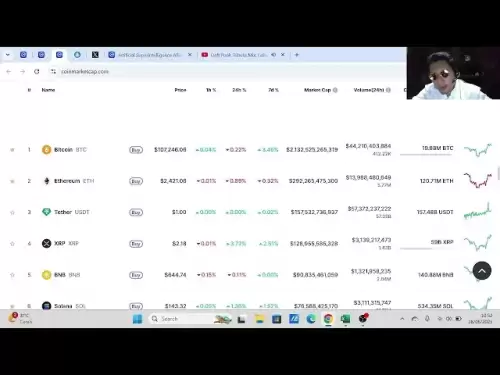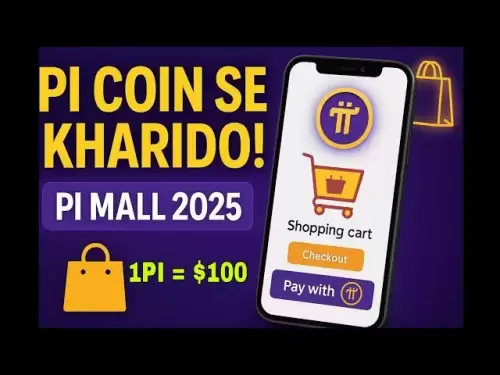-
 Bitcoin
Bitcoin $107,352.1067
0.28% -
 Ethereum
Ethereum $2,429.3531
-0.90% -
 Tether USDt
Tether USDt $1.0001
-0.02% -
 XRP
XRP $2.1894
4.62% -
 BNB
BNB $646.7968
0.36% -
 Solana
Solana $147.4290
4.03% -
 USDC
USDC $0.9998
-0.02% -
 TRON
TRON $0.2756
1.52% -
 Dogecoin
Dogecoin $0.1630
1.14% -
 Cardano
Cardano $0.5612
1.18% -
 Hyperliquid
Hyperliquid $37.0580
-0.05% -
 Bitcoin Cash
Bitcoin Cash $496.9410
-0.09% -
 Sui
Sui $2.7318
3.19% -
 Chainlink
Chainlink $13.1503
0.58% -
 UNUS SED LEO
UNUS SED LEO $9.0766
0.55% -
 Avalanche
Avalanche $17.7220
1.46% -
 Stellar
Stellar $0.2380
1.52% -
 Toncoin
Toncoin $2.8439
0.38% -
 Shiba Inu
Shiba Inu $0.0...01143
1.84% -
 Litecoin
Litecoin $85.8053
1.47% -
 Hedera
Hedera $0.1483
2.70% -
 Monero
Monero $314.3240
2.12% -
 Bitget Token
Bitget Token $4.6725
0.77% -
 Dai
Dai $1.0000
0.00% -
 Polkadot
Polkadot $3.3555
1.28% -
 Ethena USDe
Ethena USDe $1.0001
0.02% -
 Uniswap
Uniswap $7.0890
2.64% -
 Pi
Pi $0.5355
-3.40% -
 Pepe
Pepe $0.0...09393
1.06% -
 Aave
Aave $256.8136
-1.90%
Does Exodus support DeFi? How to connect to decentralized applications?
Exodus supports DeFi via its browser extension, allowing users to connect to Ethereum-based dApps for token swapping, lending, and yield farming.
May 10, 2025 at 08:36 pm
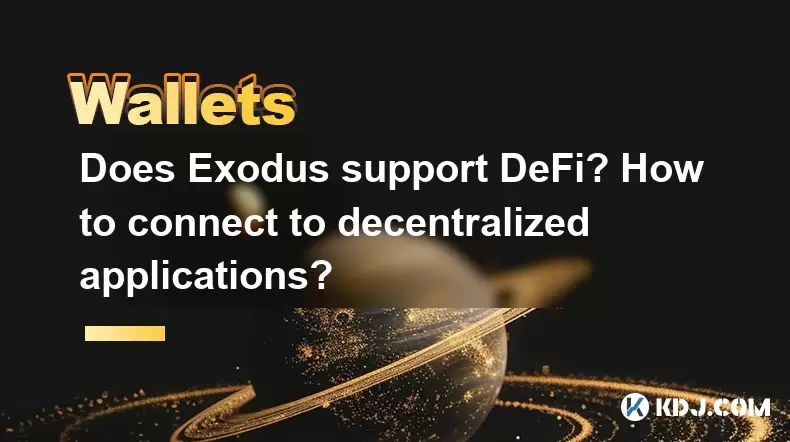
Does Exodus Support DeFi? How to Connect to Decentralized Applications?
Exodus is a popular cryptocurrency wallet known for its user-friendly interface and support for a wide range of cryptocurrencies. However, one of the frequently asked questions among users is whether Exodus supports DeFi (Decentralized Finance) and how to connect to decentralized applications (dApps). This article will delve into these topics and provide a comprehensive guide on how to use Exodus to interact with the DeFi ecosystem.
Understanding DeFi and Its Importance
Decentralized Finance, or DeFi, refers to financial services built on blockchain technology, which operate without central intermediaries such as banks or brokers. DeFi platforms allow users to lend, borrow, trade, and earn interest on their cryptocurrencies. The significance of DeFi lies in its potential to democratize finance by offering accessible financial services to anyone with an internet connection.
Exodus, while primarily a wallet for storing and managing cryptocurrencies, has taken steps to integrate with the DeFi ecosystem. This integration allows users to interact with various DeFi protocols directly from their Exodus wallet.
Exodus's Integration with DeFi
Exodus has made efforts to support DeFi through its browser extension and mobile app. The browser extension, in particular, enables users to connect to Ethereum-based dApps, which are at the forefront of the DeFi movement. This extension is a crucial tool for users looking to engage with DeFi platforms.
To connect to DeFi platforms using Exodus, users need to install the Exodus browser extension. This extension supports the connection to Ethereum dApps, which is essential for accessing many DeFi services. The mobile app also provides some DeFi functionalities, though it is less comprehensive than the browser extension.
How to Connect to Decentralized Applications Using Exodus
Connecting to decentralized applications using Exodus involves a few straightforward steps. Here's how you can do it:
- Install the Exodus Browser Extension: Start by installing the Exodus browser extension from the Chrome Web Store or Firefox Add-ons. This extension is compatible with both browsers.
- Set Up the Extension: Once installed, open the extension and connect it to your existing Exodus wallet. You'll need to enter your wallet's password to authorize the connection.
- Navigate to a DeFi Platform: Open a new tab in your browser and navigate to the DeFi platform you wish to use. Popular platforms include Uniswap, Aave, and Compound.
- Connect Your Wallet: On the DeFi platform's website, look for the option to connect your wallet. Click on it, and select 'Exodus' from the list of available wallets.
- Authorize the Connection: You will be prompted to authorize the connection between the DeFi platform and your Exodus wallet. Confirm the authorization, and you will be connected to the platform.
Once connected, you can interact with the DeFi platform directly from your Exodus wallet. You can swap tokens, provide liquidity, stake assets, and more, depending on the features offered by the platform.
Security Considerations When Using DeFi with Exodus
When engaging with DeFi platforms, security should be a top priority. Here are some tips to ensure your safety:
- Use Strong Passwords: Always use a strong, unique password for your Exodus wallet. Avoid using easily guessable passwords.
- Enable Two-Factor Authentication (2FA): If available, enable two-factor authentication on both your Exodus wallet and the DeFi platforms you use.
- Be Wary of Phishing Scams: Always double-check the URLs of the DeFi platforms you visit. Phishing sites can look very similar to legitimate ones.
- Keep Your Software Updated: Ensure that your Exodus wallet, browser, and any other software you use are up to date with the latest security patches.
Limitations of Using Exodus for DeFi
While Exodus provides a convenient way to connect to DeFi platforms, it's important to be aware of its limitations. Exodus currently supports only Ethereum-based dApps through its browser extension. This means that if you want to interact with DeFi platforms built on other blockchains, such as Binance Smart Chain or Solana, you will need to use a different wallet.
Additionally, the mobile app's DeFi capabilities are more limited compared to the browser extension. While you can perform some basic DeFi operations on the mobile app, more advanced features are only available through the browser extension.
Exploring DeFi Opportunities with Exodus
With Exodus, you can explore a variety of DeFi opportunities. Here are some examples of what you can do:
- Token Swapping: Use platforms like Uniswap to swap one token for another directly from your Exodus wallet.
- Lending and Borrowing: Platforms like Aave allow you to lend your assets to earn interest or borrow against your collateral.
- Yield Farming: Participate in yield farming on platforms like Compound to earn rewards by providing liquidity.
- Staking: Stake your assets on platforms like Lido to earn staking rewards.
Each of these activities can be performed directly from your Exodus wallet, provided you are connected to the respective DeFi platform.
Frequently Asked Questions
Q: Can I use Exodus to connect to DeFi platforms on blockchains other than Ethereum?
A: Currently, Exodus's browser extension only supports Ethereum-based dApps. If you want to interact with DeFi platforms on other blockchains, you will need to use a different wallet that supports those blockchains.
Q: Is it safe to connect my Exodus wallet to DeFi platforms?
A: While connecting your Exodus wallet to DeFi platforms can be safe, it's important to follow best security practices. Use strong passwords, enable 2FA where possible, and be cautious of phishing scams.
Q: Can I use the Exodus mobile app for all DeFi activities?
A: The Exodus mobile app offers some DeFi functionalities, but it is less comprehensive than the browser extension. For more advanced DeFi activities, you should use the browser extension.
Q: What should I do if I encounter issues connecting my Exodus wallet to a DeFi platform?
A: If you encounter issues, ensure that your Exodus wallet and browser are up to date. Check the DeFi platform's support documentation for any known issues or troubleshooting steps. If problems persist, you may need to reach out to Exodus support for assistance.
Disclaimer:info@kdj.com
The information provided is not trading advice. kdj.com does not assume any responsibility for any investments made based on the information provided in this article. Cryptocurrencies are highly volatile and it is highly recommended that you invest with caution after thorough research!
If you believe that the content used on this website infringes your copyright, please contact us immediately (info@kdj.com) and we will delete it promptly.
- Ripple, CEO, and the XRP ETF Buzz: What's Next?
- 2025-06-29 00:30:13
- Ripple (XRP) and Crypto Analysis: Navigating Trends and Insights
- 2025-06-29 00:30:13
- Aave Price Bull Rally: Can AAVE Defend Its Critical Support Zone?
- 2025-06-29 00:50:12
- BlockDAG, Avalanche, Airdrop: Shaking Up the Crypto Scene with Innovative Strategies
- 2025-06-29 00:50:12
- Ethereum to $10,000? Crypto Analysts Weigh In on ETH's Ambitious ATH
- 2025-06-29 00:35:12
- Zilliqa 2.0: EVM Support and Protocol Overhaul Usher in a New Era
- 2025-06-29 01:10:13
Related knowledge

How to stake cryptocurrencies on Coinbase? Benefits and risks
Jun 27,2025 at 06:36pm
Understanding Cryptocurrency Staking on CoinbaseStaking cryptocurrencies involves locking up digital assets to support the operations of a blockchain network, typically in return for rewards. Coinbase, one of the most popular cryptocurrency exchanges globally, offers staking services for several proof-of-stake (PoS) coins. Users can stake their holdings...

How to contact Coinbase customer service? Support channels and response times
Jun 28,2025 at 01:29pm
Contacting Coinbase Customer Service: Support Channels and Response TimesIf you're a user of Coinbase, reaching their customer service team may become necessary for various reasons, such as account verification issues, transaction disputes, or technical difficulties. Understanding the different support channels available and what to expect in terms of r...

Coinbase advanced trading function usage tutorial: limit orders and market orders
Jun 28,2025 at 09:07pm
Understanding the Difference Between Limit Orders and Market OrdersWhen using Coinbase's advanced trading features, it is crucial to understand the fundamental difference between limit orders and market orders. A market order executes immediately at the best available price on the market. This type of order ensures that your trade goes through quickly, ...
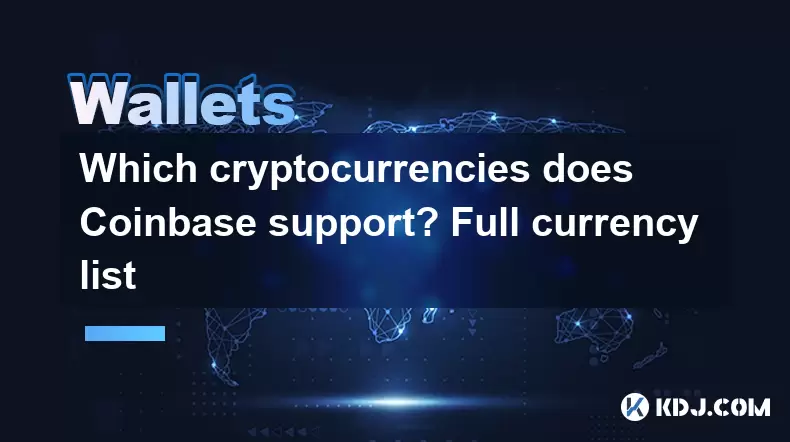
Which cryptocurrencies does Coinbase support? Full currency list
Jun 28,2025 at 08:36am
Overview of Cryptocurrencies Supported by CoinbaseCoinbase is one of the most popular and trusted cryptocurrency exchanges globally. It provides users with a platform to buy, sell, trade, and store various digital assets. As of the latest updates, Coinbase supports over 200 cryptocurrencies, including major ones like Bitcoin (BTC), Ethereum (ETH), and L...
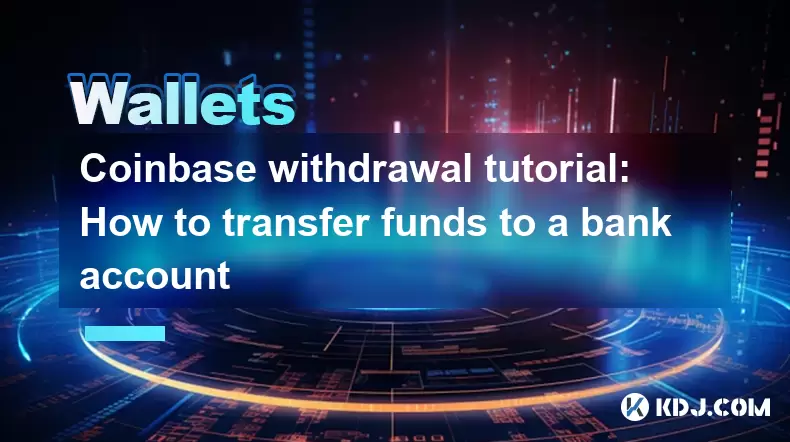
Coinbase withdrawal tutorial: How to transfer funds to a bank account
Jun 28,2025 at 02:35am
Understanding Coinbase WithdrawalsCoinbase is one of the most widely used cryptocurrency platforms, allowing users to buy, sell, and store digital assets. Once you've successfully traded or held your crypto on Coinbase, the next logical step may be to withdraw funds to a bank account. This process involves converting your cryptocurrency into fiat curren...
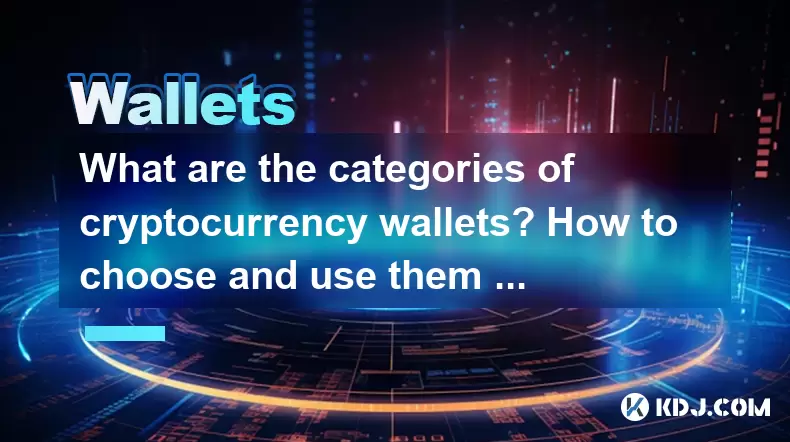
What are the categories of cryptocurrency wallets? How to choose and use them safely?
Jun 21,2025 at 10:42pm
Understanding Cryptocurrency WalletsCryptocurrency wallets are essential tools for anyone involved in the digital asset ecosystem. They allow users to store, send, and receive cryptocurrencies securely. Unlike traditional wallets that hold physical money, crypto wallets manage cryptographic keys—private and public—which interact with blockchain networks...

How to stake cryptocurrencies on Coinbase? Benefits and risks
Jun 27,2025 at 06:36pm
Understanding Cryptocurrency Staking on CoinbaseStaking cryptocurrencies involves locking up digital assets to support the operations of a blockchain network, typically in return for rewards. Coinbase, one of the most popular cryptocurrency exchanges globally, offers staking services for several proof-of-stake (PoS) coins. Users can stake their holdings...

How to contact Coinbase customer service? Support channels and response times
Jun 28,2025 at 01:29pm
Contacting Coinbase Customer Service: Support Channels and Response TimesIf you're a user of Coinbase, reaching their customer service team may become necessary for various reasons, such as account verification issues, transaction disputes, or technical difficulties. Understanding the different support channels available and what to expect in terms of r...

Coinbase advanced trading function usage tutorial: limit orders and market orders
Jun 28,2025 at 09:07pm
Understanding the Difference Between Limit Orders and Market OrdersWhen using Coinbase's advanced trading features, it is crucial to understand the fundamental difference between limit orders and market orders. A market order executes immediately at the best available price on the market. This type of order ensures that your trade goes through quickly, ...

Which cryptocurrencies does Coinbase support? Full currency list
Jun 28,2025 at 08:36am
Overview of Cryptocurrencies Supported by CoinbaseCoinbase is one of the most popular and trusted cryptocurrency exchanges globally. It provides users with a platform to buy, sell, trade, and store various digital assets. As of the latest updates, Coinbase supports over 200 cryptocurrencies, including major ones like Bitcoin (BTC), Ethereum (ETH), and L...

Coinbase withdrawal tutorial: How to transfer funds to a bank account
Jun 28,2025 at 02:35am
Understanding Coinbase WithdrawalsCoinbase is one of the most widely used cryptocurrency platforms, allowing users to buy, sell, and store digital assets. Once you've successfully traded or held your crypto on Coinbase, the next logical step may be to withdraw funds to a bank account. This process involves converting your cryptocurrency into fiat curren...

What are the categories of cryptocurrency wallets? How to choose and use them safely?
Jun 21,2025 at 10:42pm
Understanding Cryptocurrency WalletsCryptocurrency wallets are essential tools for anyone involved in the digital asset ecosystem. They allow users to store, send, and receive cryptocurrencies securely. Unlike traditional wallets that hold physical money, crypto wallets manage cryptographic keys—private and public—which interact with blockchain networks...
See all articles























